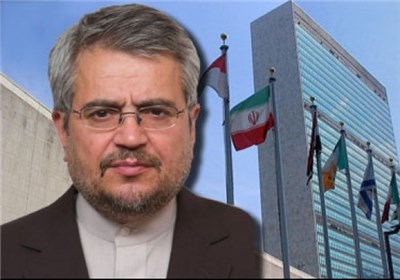Mr. Chairman,
Excellencies,
Ladies and Gentlemen,
Let me start by thanking H.E. Sam Kutesa, President of the General
Assembly for convening this meeting on the topic of ‘A Culture of Peace’.
I believe the issue at hand today is of utmost importance, especially at
this juncture; and forums like this may contribute by bringing together
governments, the United Nations System and civil society to strengthen
their partnerships for making the culture of peace a reality.
‘A culture of peace’ has always been at the core of the work of this
organization. Seventy years ago, the founders of the organization,
expressed in the preamble of the Charter their desire ‘to practice
tolerance and live together in peace with one another as good neighbors’.
After Seventy years, this issue is still of critical importance. If peace
is the main pillar of this organization, then a culture of peace which
serves as a basis for peace is critical. Peace cannot be sustained without
a culture which nourishes and enhances it. Without peace, culture cannot
exist and without culture, peace does not last long.
The question on how to foster such a culture has gained increasing
relevance and urgency in the recent years, which is due to the rising
maligned activities, especially in some parts of the world, by some wicked
elements who are inherently opposed to peace, and the culture of peace is
anathema to them. It is this dark and blind enmity to peace and tolerance,
sponsored by some powers from inside and outside of the region, which has
caused the unbearable plight of the people in our region, from Syria to
Iraq.
Immature mentalities still exist in some powerful countries that leads
them to believe that the solution to every dispute lies in threats,
sanctions and war. They believe bullying and war-mongering is a panacea to
solve all problems of the humanity. Their machines of war have great
destructive capabilities, but does not have the capability to create
interaction, partnership and peace.
Today the world needs to move on from the terrifying monster of war to the
beautiful culture of peace and friendship. In order to reach a
peace-seeking society and a free and fully developed humanity we must
abandon the reliance on weapons of mass destruction and look to the
life-giving culture of peace. War is the primary reason for insecurity,
injustice and underdevelopment around the world. War-mongerers must reach
the maturity of thought and realize that only by addressing humanity’s
primary needs such as education, healthcare, environmental protection and
sustainable development can we forward the cause of peace and friendship.
Mr. Chairman,
In few days, leaders of the world will gather in this same assembly to
adopt the transformative Post-2015 Development Agenda, which is a truly
ambitious agenda for the activities of the organization in the years to
come. We believe that the culture of peace should be re-enforced in the
context of the new development agenda. Peace and development go hand in
hand. Under-development is one of the main root causes of tendency towards
extremism, and without achieving a sustainable and just development for
people all over the world, the issue of violent extremism cannot be
tackled.
Some of the goals and targets of the Sustainable Development Goals (SDGs)
are directly relevant to the issue of peace and a culture of peace. In
this regard, we reiterate the importance of education, as stipulated in
Goal 4, for both development and peace. Quality education and learning
opportunities can instill the values of tolerance and moderation in the
minds of young men and women, which prevents them from inscribing to
dangerous ideologies of violent extremists. Also, promotion of peaceful
and inclusive societies, as stipulated in Goal 16, will not only
facilitate achievement of the Sustainable Development Goals, but also will
contribute to promotion of a culture of peace.
Women, especially mothers, have a great role to play in this regard.
Education of women on values of peace and diversity would be a long-term
investment for promoting a more open and peaceful society for generations
to come. A similarly prominent role can be assumed by media. Media have an
indispensable role in forming the public awareness and combating
stereotypes and misperceptions. Pro-peace media may immensely contribute
to the culture of peace.
Mr. Chairman,
The Islamic Republic of Iran attaches great importance to all the issues
pertinent to peace. We believe ‘a culture of peace’ is an important item
in the agenda of the United Nations. Two years ago, my Government took
initiative in proposing a General Assembly resolution on “A World against
Violence and Violent Extremism” (or WAVE for short), which was adopted in
this Assembly. The initiative came from His Excellency Dr. Hassan Rouhani,
President of the Islamic Republic of Iran, in his speech in the General
Debate of the 68th session of this Assembly. The widespread support this
initiative enjoyed shows the importance of the matter in the eyes of the
whole world, as well as the need for and urgency of a resolute,
coordinated action on the part of the international community to address
the rising phenomenon of violent extremism. The developments since
adoption of the resolution bear witness to the relevance of the call and
the necessity for urgent action by all nations to curb violent extremism.
We are ready to close ranks with other members of the international
community to promote peace, moderation, dialogue and understanding among
cultures, religions and civilizations and we reiterate our absolute
adherence to peace and tolerance.






